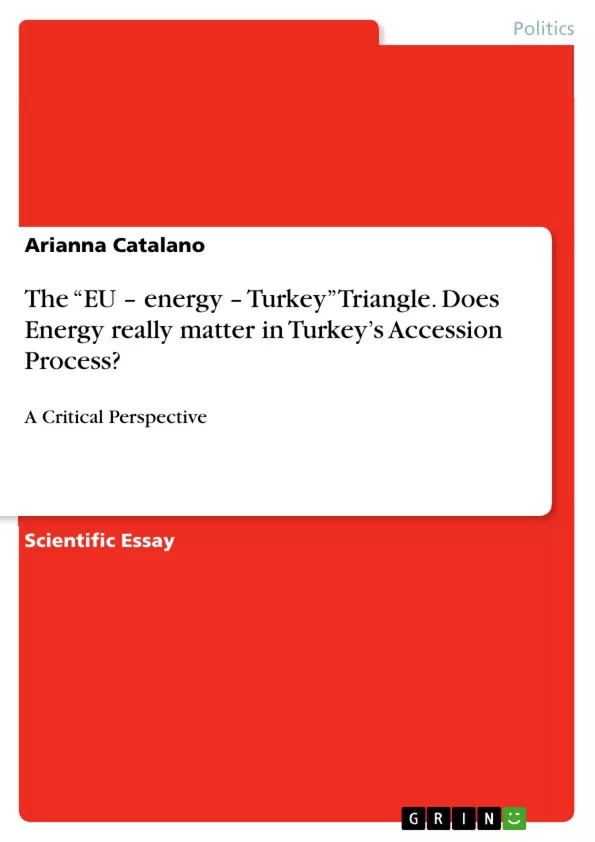The aim of this paper is to analyze the dynamics at the core of the relation between
Turkey and the European Union (EU), in terms of energy-related issues. The prospect of
Turkey’s accession to the EU is one of the most controversial issues affecting the wider
European political space. This essay would like to shed light on the impact of energy
considerations on Turkey’s process of accession exploring three inter-related dimensions.
First of all, a brief account of the EU’s patterns of energy consumption and strategies adopted
will be offered. Secondly, the relevance of Turkey as “energy corridor” linking Eastern
energy resources to Western markets will be assessed. Finally, EU member states’ standpoints
on Turkey’s accession will be investigated trying to isolate the impact of energy-driven
calculations. A liberal-intergovernmental approach will spell out patterns of divergence or
convergence on Turkey’s accession evaluating the impact of the energy factor on Turkey’s
EU eventual membership. In conclusion, this article will show whether or not energy can be
considered the determiner for Turkey’s accession, pointing out that the “energy card” should
not be overplayed since the EU’s acknowledgement of Turkey’s energy strategic could not
automatically lead to full-membership.
Inhaltsverzeichnis (Table of Contents)
- Introduction
- EU-Energy Turkey Triangle
- EU's Energy Consumption and Strategies
- Turkey and the "Energy Corridor" Role
- Turkey and the EU in the Light of Energy Considerations
Zielsetzung und Themenschwerpunkte (Objectives and Key Themes)
This paper examines the dynamics at play between Turkey and the European Union (EU), particularly regarding energy-related issues. It aims to explore the implications of energy concerns on Turkey's EU accession process, analyzing three interconnected dimensions.
- The EU's energy consumption patterns and strategies
- Turkey's role as an "energy corridor" linking Eastern energy resources to Western markets
- The impact of energy considerations on EU member states' stances on Turkey's accession
- The significance of energy cooperation in shaping Turkey's EU membership prospects
- The "EU – energy – Turkey" triangle and its implications for EU-Turkey relations
Zusammenfassung der Kapitel (Chapter Summaries)
The first section provides an overview of the EU's energy consumption patterns, highlighting the EU's dependence on energy imports and the significant reliance on Russia. It also discusses the EU's efforts to develop a more integrated energy policy and its approach to diversifying energy sources, specifically through collaboration with Central Asian and Caspian energy producers.
The second section focuses on Turkey's role as an "energy corridor" and its strategic importance for EU energy security. It examines how Turkey's position as a bridge between Eastern energy resources and Western markets creates complex dynamics within the "EU – energy – Turkey" triangle. This section also analyzes the trade-offs Turkey faces in balancing its relationship with Russia and the EU, particularly in terms of energy cooperation projects.
The third section delves into the ways in which the EU has attempted to integrate Turkey into its energy infrastructure network. It highlights the EU's recognition of Turkey's strategic significance in energy matters and its commitment to closer relations with Turkey in this domain. This section also explores different EU member states' stances on Turkey's accession, examining the influence of energy considerations on their perspectives.
Schlüsselwörter (Keywords)
This paper focuses on the interconnected issues of the EU, energy, and Turkey's accession process. Key topics include energy security, energy diversification strategies, the "EU – energy – Turkey" triangle, Turkey's role as an "energy corridor," EU member states' positions on Turkey's accession, and the impact of energy considerations on EU-Turkey relations. It also delves into the EU's dependence on energy imports, particularly from Russia, and the EU's initiatives to secure alternative energy sources.
Frequently Asked Questions
Why is Turkey considered an "energy corridor"?
Turkey acts as a strategic bridge linking energy-rich resources in the East (Caspian, Central Asia) to the high-demand Western markets in Europe.
Does energy strategic importance guarantee Turkey's EU accession?
No, while the "energy card" is significant, the paper argues it should not be overplayed as it does not automatically lead to full EU membership.
How dependent is the EU on energy imports?
The EU has a high dependence on energy imports, particularly from Russia, which drives the need for diversification through partners like Turkey.
What is the "EU – energy – Turkey" triangle?
It refers to the complex dynamics and interdependencies between the EU's energy security needs, Turkey's geographical role, and the political accession process.
What approach does the paper use to analyze these relations?
The article employs a liberal-intergovernmental approach to evaluate convergence and divergence between EU member states regarding Turkey's membership.
- Quote paper
- Arianna Catalano (Author), 2010, The “EU – energy – Turkey” Triangle. Does Energy really matter in Turkey’s Accession Process?, Munich, GRIN Verlag, https://www.grin.com/document/179858



